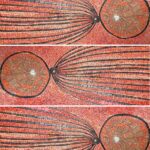 GENDER. Zeitschrift für Geschlecht, Kultur und Gesellschaft; Bettina Dennerlein, Katrin Meyer und Helena Rust (Web)
GENDER. Zeitschrift für Geschlecht, Kultur und Gesellschaft; Bettina Dennerlein, Katrin Meyer und Helena Rust (Web)
Einreichfrist: 22.06.2025
Im Zentrum des geplanten Heftschwerpunkts steht die „Politizität“ von Feminismen als interventionistische Praxis, insbesondere das Interesse daran, wie feministische Bewegungen dazu beitragen, politische Kräfteverhältnisse und die damit verbundenen Strukturen und Normen zu erkennen und zu verändern. Gefragt sind u. a. Beiträge aus der politischen Philosophie und Theorie, der Feminismusforschung im Globalen Süden und der Feminismusgeschichte. Weiterlesen … (PDF)
– –
The current call focuses on the “politicity” of feminisms as an interventionist practice. The focus is on how feminist movements intervene in political conflicts and contribute to recognizing and changing power relations and the associated structures and norms. We welcome contributions especially from the fields of political philosophy and theory, research on feminisms in the Global South, and the history of feminisms. Read more … (PDF)

 Zweites Forum Geschlechtergeschichte/n für Dissertant:innen und Forscher:innen in Österreich und angrenzenden Regionen; Heidrun Zettelbauer und Katharina Scharf (Graz)
Zweites Forum Geschlechtergeschichte/n für Dissertant:innen und Forscher:innen in Österreich und angrenzenden Regionen; Heidrun Zettelbauer und Katharina Scharf (Graz) Journal „The Space Between: Literature & Culture 1914-1945“; Layne Craig and Alexandra Edwards
Journal „The Space Between: Literature & Culture 1914-1945“; Layne Craig and Alexandra Edwards 
 ofra: online archiv frauenpolitik – Projekt des Bruno Kreisky Archivs|Johanna Dohnal Archivs
ofra: online archiv frauenpolitik – Projekt des Bruno Kreisky Archivs|Johanna Dohnal Archivs  Verein für Geschichte der ArbeiterInnenbewegung (VGA)
Verein für Geschichte der ArbeiterInnenbewegung (VGA)  Institut für Historische Sozialforschung der ArbeiterInnenkammer Wien
Institut für Historische Sozialforschung der ArbeiterInnenkammer Wien  University of Nebraska Press: Home Front Studies
University of Nebraska Press: Home Front Studies